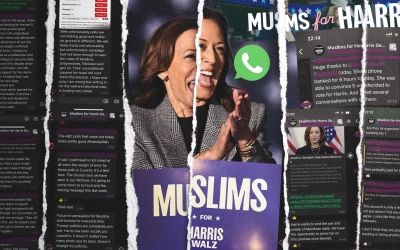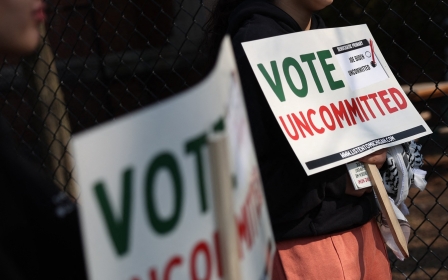US elections 2024: As Americans head to polls, the world braces for the fallout

Election day has finally arrived in the United States, with tens of millions of Americans heading to the polls in what could be the most consequential vote in recent history.
Over 70 million Americans have already cast their ballots in what is essentially a two-horse race between sitting Vice President Kamala Harris and former President Donald Trump.
Both candidates appear to be locked in a knife-edge contest with hardly any light between the pair, according to national opinion polls.
But the policies of the White House hopefuls couldn't be more starkly different, and for the first time in years, women's reproductive health, especially their right to abortion, is playing a crucial role.
For Trump, a convicted felon who is seeking a second term, the core campaign issue has been migrants and the economy, along with a pledge to push back against so-called "woke culture".
New MEE newsletter: Jerusalem Dispatch
Sign up to get the latest insights and analysis on Israel-Palestine, alongside Turkey Unpacked and other MEE newsletters
Both have embarked on a frenetic zig-zag through swing-states, with raucous rallies and even an appearance by Harris on "Saturday Night Live" in a bid to court undecided voters.
The results of a raft of states are expected to be called as soon as polls close at around 7pm local time. However, if the previous election is anything to go by, it could take several days for the overall result to be announced.
'Genocide should be a red line, not just for the people who are affected by it, but for anyone who has a conscience'
- Maryam Alwan, young voter
In 2020, it took four days for Pennsylvania to be called for Joe Biden after a knife-edge result that secured him the Oval Office.
Under the complex American political system, the overall result won't be decided by the national popular vote but the electoral college in which each state's number of electors is weighed roughly by the size of its population.
Each candidate needs 270 votes in the electoral college to clinch victory, and the battleground is formed of those states where polls indicate a state could go either way.
As a result, swing states, such as Michigan, could prove to be crucial for both of the candidates.
"It is impossible for us to support a genocide," Isabella, an activist with the Palestine Youth Movement, told Middle East Eye at a rally in New York City over the weekend.
"This is clearly a red line for a majority of Americans, and whilst there may be other issues [which we agree with the Democratic Party on] we cannot go every day witnessing the horrors of Gaza knowing this is what our government is supporting."
Israel has caused widespread death and destruction in Gaza after the 7 October attacks on southern Israel, targeting civilian residences, schools, hospitals, mosques, and UN shelters.
So far, the official death toll is over 43,000 Palestinians. However, with Gaza's health infrastructure having been left incapacitated due to Israeli bombing, the number of Palestinians killed by Israel is likely to be far higher.
US support for Israel's wars could also upend voting patterns among young, anti-war and minority background voters who are increasingly angry and disillusioned with the Democratic Party.
Columbia University student Maryam Alwan, a first-generation Palestinian American, who used to "fully identify as a Democrat" when she was 18 and voted for Biden in 2020, said that she was among many young voters who would not be voting blue on Tuesday.
Instead, Alwan said she would be mailing her ballot to her home state of Virginia to cast her vote for the Green Party candidate, Jill Stein.
"It's not a 'lesser of two evil situation'," Alwan told MEE.
"Genocide should be a red line, not just for the people who are affected by it, but for anyone who has a conscience."
Alwan said that if a historic turnout for a third party cost the Democrats the election, the party would be forced to change its behaviour.
Stein has been gaining popularity in Arab and Muslim communities amid Israel’s brutal war on Gaza and Lebanon, public opinion polls show.
While the Green Party candidate is extremely unlikely to win the presidency, her supporters see her as a principled choice that can set the foundation for greater viability for future third-party candidates.
Critical juncture
The US election comes as the world finds itself at one of the most critical junctures of the post-Cold War era with stark differences between how the two candidates are likely to conduct their foreign policy.
Harris has faced criticism over her foreign policy experience, and a draft of the Democratic Party platform for 2024 seen by MEE failed to provide answers on how she would deal with a raft of issues.
For many analysts, the 14 million people who live in Israel and occupied Palestiniane will likely be the most impacted by the next administration's Middle East policy.
An opinion poll conducted in September by Mitvim, the Israel Institute for Regional Foreign Policies, showed strong support for Trump among both right-wing and centrist Israelis, with some 68 percent of Israelis seeing Trump as the candidate who will "best serve Israel's interests", while just 14 percent back Harris.
In 2020, Israeli Prime Minister Benjamin Netanyahu described Trump as "the best friend Israel has ever had in the White House", thanks to the then-president’s decision to move the US embassy from Tel Aviv to Jerusalem and recognise Israeli sovereignty over the Golan Heights.
And in the final months of his presidency, Trump also helped broker the Abraham Accords, agreements Israel made to establish open ties with Bahrain, the United Arab Emirates, Morocco and Sudan.
Few expect a Harris administration to turn away from Israel, but many have said she has often presented herself as a more compassionate voice in the Biden administration when it comes to the Palestinians.
US-Iran relations are another key foreign policy issue that the next president will have to address and both Harris and Trump have expressed hard-line views on the Islamic Republic, with Harris calling it the US' "greatest adversary".
Iran's leadership has not made clear which candidate it prefers, but reports have suggested that it has delayed a potential attack against Israel until after the election and before the January inauguration.
Iran's Supreme Leader Ayatollah Ali Khamenei and senior military officials have continued their threats against Israel in recent days. On Sunday, President Masoud Pezeshkian said Israel's recent strikes on Iran couldn't go unanswered, but added that "the type and intensity" of the response depended on whether a ceasefire could be reached in Lebanon or Gaza.
Western officials have said that Tehran was still discussing options for the attack, including the possibility of using its allied armed groups in Iraq to attack Israel, which would lend a measure of deniability and perhaps prevent further strikes on Iranian territory.
Saudi Arabia and the United Arab Emirates are likely to gain economically and militarily from a Trump victory, having previously enjoyed unprecedented levels of US support during his administration, including Washington's hard-line stance against Iran.
A senior Arab official told MEE that Gulf states were intently focused "on how the next administration would tackle the Houthis".
The Houthis, a Yemeni movement officially known as Ansar Allah, are one member of the so-called "axis of resistance", which Iran has cultivated to challenge Israeli and US adventurism in the Middle East.
Tehran has varying degrees of influence over this network, with the Houthis launching several drone strikes against Israel since the war on Gaza erupted, along with targeting international shipping vessels in the Red Sea region.
Gerald Feierstein, a former US ambassador to Yemen under the Obama administration, told MEE that the most direct way for the US to stop the Houthi attacks was to achieve a ceasefire in Gaza.
"If that war ends, the casus belli goes away. It will be harder for the Houthis to justify their attacks," Feierstein said.
It's unclear which candidate Turkish President Recep Tayyip Erdogan prefers, but sources among his entourage told MEE that they believed a Trump presidency could work well due to their shared history. Others in his ruling Justice and Development Party (AKP) said they prefer the prospect of stable relations under Harris.
In Europe, the prospect of a second Trump term has proved to be deeply unsettling for some, with the Republican repeatedly threatening to withdraw from Nato.
"What will happen if a president [Trump] is elected for a second time in America who declares Nato obsolete and is no longer willing to keep security promises?" Friedrich Merz, party leader of Germany’s conservative Christian Democrats, told supporters last week.
"Then we will be on our own. And by that, I don't just mean us Germans, but we Europeans."
Middle East Eye delivers independent and unrivalled coverage and analysis of the Middle East, North Africa and beyond. To learn more about republishing this content and the associated fees, please fill out this form. More about MEE can be found here.






